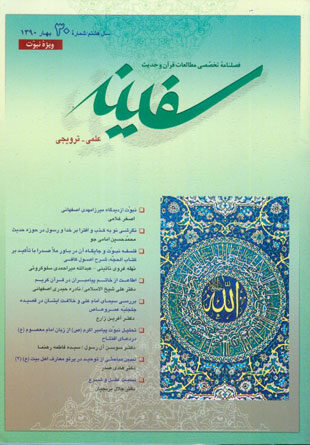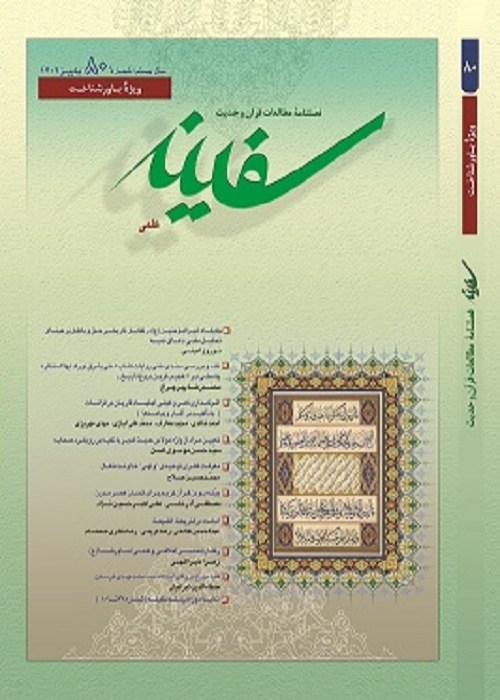فهرست مطالب

نشریه سفینه
پیاپی 30 (بهار 1390)
- ویژه نبوت
- 192 صفحه،
- تاریخ انتشار: 1390/03/18
- تعداد عناوین: 10
-
-
صفحه 5
- مقالات
-
صفحه 12پاسخ آیه الله میرزا مهدی اصفهانی به این پرسش که «شناخت پیامبر چگونه و از چه راهی محقق می شود»، در این گفتار بررسی شده است. محوریت عبودیت و تذکر به نور عقل و اثاره عقول بشر، سبب می شود که شناخت پیامبر، فطری باشد. در این میان، نقش معجزه و کارکرد آن نیز بررسی شده است.
کلیدواژگان: اصفهانی، میرزامهدی، نبوت، عبودیت، عقل، نور الهی، فطرت، نبوت، معجزه -
صفحه 31کذب و افترا بر خدا و رسول بر نگرش ما نسبت به احادیث، اثری مهم دارد. نویسنده، ابتدا معنای کذب و افترا، سپس زشتی کذب وافترا بر خدا و رسول و اقسام آنها، به ویژه انکار وحیانی بودن دین را بررسی کرده و نتیجه می گیرد که احتمال صدق حدیث مانع از رد حدیث می شودکلیدواژگان: حدیث، نگرشها، دروغ، تهمت، کذب و افترا، وحی، دیدگاه ها
-
صفحه 59تامل در مباحث کتاب الحجه اثر گران سنگ و عظیم شرح الاصول الکافی ما را به این نکته رهنمون می سازد که صدرالمتالهین در این کتاب همواره بر آن بوده است که نبوت و ماهیت آن را به منزله مقامی جعلی و انتسابی از جانب خداوند با حقایق صادر شده از بیانات ائمه معصومین: ، تفسیر و تطبیق نماید. با وجود صبغه کلامی و عقلی مفهوم نبوت، ملاصدرا هرگز این منصب را با قرائت بشری و غیرالهی بررسی نکرده است و به عکس، با در نظر گرفتن اصالت آموزه های روایی و با کنار هم نهادن قرائن نقلی در تبیین روایات کتاب الحجه الکافی، بر فرابشری و الهی بودن این مقام اصرار می ورزد. او هنگام شناسایی نبی، تعریف نبوت، تفاوت نبی و رسول، ضرورت ارسال پیامبر، خصلتهای پیامبران و مراتب آنان و مباحثی از این دست، با رویکردی برهانی و عرفانی، از تطبیق و سازگاری میان این رویکرد با معیار قرار دادن حدیث چشم پوشی ننموده و با حساسیت تمام، در هماهنگی و همسان سازی عقل و حکمت با روایات مرتبط با مقام نبوت در کتاب الحجه کوشیده است.
کلیدواژگان: نبوت، نبی، ضرورت بعثت، راه های شناخت پیامبران، امتیازات پیامبران، درجات پیامبران، اصول کافی، ملاصدرا -
صفحه 85رسول و امت، هر یک مسئولیتی دارند. رسول، مسئول تبلیغ آیات و احکام الهی است و امت اسلامی، مسئول فهم و پذیرش دعوت الهی. در واقع، حقیقت اطاعت، کوشش برای رسیدن به هدف والای رسول است.
مسئولیت خاتم پیامبران، بلاغ آشکار و وظیفه مومنین، اطاعت در مقابل وظیفه رسول، یعنی بلاغ است. اطاعت مومنین از رسول اکرم موجب هدایت، قبولی اعمال، وحدت و دوری از گناه می شود و سرپچی از دستورات، باعث عذاب دنیوی و اخروی است. بنابراین، اطاعت از رسول یکی از موارد امتحانات الهی برای مومنان است.
کلیدواژگان: اطاعت خدا، اطاعت رسول، اولی الامر، سنت -
صفحه 103غدیر خم که در هجدهم ذی الحجه سال دهم هجرت و در آخرین حج عمر گرانمایه پیامبر اکرم (ص) به وقوع پیوست، تاکیدی محکم و متین بر خلافت و امامت امیرالمومنین امام علی (ع) به امر پروردگار بود که قرآن کریم، حدیث شریف نبوی و تاریخ، گواه غیرقابل انکار آن است. واقعه عظیم غدیر، مرزهای دینی و تاریخی را درنوردیده و در ادبیات نیز انعکاس یافته است تا آنجا که شاعران فراوانی از عرب و عجم و مسلمان و غیرمسلمان، نصب امیرالمومنین (ع) را به امامت و ولایت به امر یگانه ایزد و به دست آخرین فرستاده (ص) در اشعارشان به تصویر کشیده اند.
نکته قابل توجه این است که حتی سرسخت ترین دشمنان «سید الاوصیاء» از پنهان ساختن این حقیقت تابناک درمانده اند که از میان آنها می توان به عمروعاص اشاره کرد.
این مقاله بر آن است تا ضمن بررسی قصیده جلجلیه و تحلیل درون مایه های آن، دیدگاه سراینده اش را درباره غدیر خم و مسئله جانشینی پس از حضرت محمد (ص)با استناد به شواهدی از قرآن کریم و حدیث شریف و تاریخ، تبیین نماید و از رسالت ادبیات در منعکس کردن حقایق بهره بردکلیدواژگان: قصیده جلجلیه، بررسی، عمروعاص، غدیر خم، امام علی (ع) -
صفحه 122دعای افتتاح که منتسب به حضرت صاحب الامر (عج) است، دارای مضامین عالی و بلندی است که گنجینه ای از معارف توحید، نبوت و امامت را در بر دارد. در این مقاله، بحث نبوت آن بررسی می شود.این دعا با صلوات بر پیامبر خاتم، باب پیامبرشناسی را گشوده و در ضمن صلوات، بارزترین ویژگی های پیامبر (ص) را برشمرده است. در این تحقیق، ضمن تحلیل اصل اعتقادی نبوت، ویژگی ها و اوصاف عبودیت، رسالت، امانت، برگزیدگی، محبوبیت، حفظ سر الهی و مبلغ بودن نبی اکرم (ص) بررسی می شوندکلیدواژگان: دعای افتتاح، صلوات، عبد، رسول
-
صفحه 141نگارنده، ابتدا معنای عقل و میزان کاربرد آن در مباحث توحید را براساس احادیث کتاب کافی بیان می دارد. آنگاه به طرح فلسفه صدرایی در مورد توحید و آنگاه به مطالعه تطبیقی میان آنها می پردازدکلیدواژگان: توحید، اشتراک لفظی و معنایی، فلسفه صدرایی توحید، کافی (کتاب)، توحید
- نکته پژوهشی
-
صفحه 153نسبت عقل و شرع براساس دیدگاه های آیه الله میرزا مهدی اصفهانی (13031365 قمری) موضوع این گفتار است. میرزای اصفهانی عقل را نوری می داند که خداوند به انسانها می بخشد و حجت خود بر آنها قرار می دهد، حجیت تمام حجتهای دیگر به عقل برمی گردد. البته احکام شرعی براساس کسر و جبر مصالح و مفاسد، تشریع می شود. و این تشریع به حکم عقل فقط کار خداوند حکیم است.
کلیدواژگان: عقل، شرع، اصفهانی میرزامهدی، حجتهای خدا -
صفحه 182
-
Page 12Here, Ayatollah Mirza Mahdi Esfahani replies to the query "How and by what means the (true) prophet is recognized"? The vital matter of servitude and recollection of light of reason (Nur-e-Aql) and effects of human intellects (Uqul) causes one to realize that prophets¨ recognition is "Fitri" (innate). Besides, the role of miracle and its outcome are also discussed.Keywords: Esfahani, Mirza Mahdi, Prophethood, Servitude, Aql, divine light, Fitrat, Prophethood, Miracles
-
Page 31Fabrication and slander against Allah and His Prophet has vital consequences on our outlook towards the traditions (Ahadith). Initially, the writer discusses the concept of lies and slander, and thereafter, the ugliness of lies and slander against Allah and His apostle; and various kinds of denial concerning divine revelation of religion. He derives conclusion that probability of truthfulness of a hadith should prevent its rejection.Keywords: Hadith, Perspectives, Accusations, Lies, Slander, Revelation, views
-
Page 59Deliberation over the discussion in the book Al-hujjah, the invaluable and great commentary on Usool-e-Kafi, leads one to the fact that Sadr¨ul-Mute¨alehin was constantly determined to interpret prophethood and its essence, as a position divinely attributed to God, with the true sayings of Imams. In spite of theological and rational meaning of prophethood, Molla-Sadra does not recognize this rank to hold human and non-divine perusal but instead by considering the originality of teachings from traditions and reconciling narrative analogues in explaining the traditions of the book Al-hujjah, he emphasies over the divinity of this rank and that it is beyond human. While defining the prophet and prophet-hood, differentiating prophet with messenger, the need for sending prophet, the characteristics of prophets and their ranks and topics of this nature, with a rational and theosophical approach, he collates this approach with the yardstick of hadith. In the book Al-hujjah, he strives with utmost sensitivity to coordinate and analog reason (Aql) and theosophy (hikmat) with traditions related to prophet-hood.Keywords: prophet, hood, prophet, the need for prophet¨s appointment, ways to recognizea prophet, the privileges that prophets hold, the ranks of prophets, Usool, e, kafi, Molla, Sadra
-
Page 85The messenger and the people have aresponsibilities. The messenger is responsible to propagate the verses and divine ordinances and the Islamic nation is responsible to comprehend and accept the divine invitation. In fact, the reality of obedience is an endeavor for reaching a lofty goal.The responsibility of the last prophet is clear presentation (of message); and the responsibility of the believers is acceptance of the prophet¨s responsibility i.e. message. Obedience towards the prophet leads the believers to guidance and becomes a source for acceptance of their deeds, brings unity and keeps them aloof from sins. Disobeying the commands leads to punishment in this world and hereafter. Thus, obedience towards the prophet is one of the divine tests for the believers.Keywords: Obey of God, Obey of the Messenger, the authoritarians, the traditions
-
Page 103Ghadir-e-Khum that came to happen on the 18th Zil-hajj, 10 A.H. during the last Hajj of the holy prophet (s.a.w.a) was a decisive and firm stress laid down by divine command for Imam Ali¨s caliphate and Imamate. In this regard, the holy Quran, the noble prophet¨s hadith and history, all and all, bear witnesses to this fact. The great event of Ghadir has traversed the divine and historical boundaries and has also reflected itself in literature so that numerous poets, Arabs or non-Arabs, Muslims or non-muslims have portrayed in their poems, Amir-ul-Mu¨mineen¨s appointment to the Imamate and Vilayat by divine command, and by acknowledgment of the last prophet.The point worthy to mention is that the severest enemies of Imam Ali were helpless from concealing this reality. From them one can mention the name of Amr-e-Aas.This article while examining and analyzing the elegy "Jaljaliah" is determined to make clear the composer¨s viewpoint concerning Ghadir-e-Khom, and the matter of holy prophet¨s successor by relying on testimonies from the Quran, hadith and history and making use of literature in reflecting the truth.Keywords: Elegy of Jaljaliah, examining, Amr, e, Aas, Ghadir, e, Khum, Imam Ali (p.b.o.h)
-
Page 122Dua-e-Eftetah related to Imam-e-Zaman (a.t.f.s) comprises of lofty and sublime meanings that are treasures of "Ma¨aref" (knoeledge) on monotheism, prophethood and Imamate. In this article, the section related to prophet-hood is discussed. By salutations upon the last prophet, this "dua" has opened up the chapter concerning " recognition of prophet", while sending salutations; it enumerates the most brilliant qualities of the prophet. In this research, while analyzing the on prophethood, it also discusses the specialties and qualities of servitude, messengership, trust, appointment, affection, protection of divine secret and prophet as an evangelist.Keywords: Dua, e, Eftetah, Salutation, messenger, Obedient
-
Page 141: The writer explains the meaning of reason (Aql) and its application in the discussions on monotheism (Tauhid) based on traditions come down in the book "Al-Kafi". Thereafter, he engages in philosophy of Sadra concerning monotheism (Tawhid) and a comparative study among them.Keywords: Tawhid (monotheism), literal, implicational similarities, philosophy of Sadra, Tawhid, Kafi (book), Tawhid
-
Page 153The topic of this discussion concerns relation between reason an divine law from the viewpoint of Ayatollah Mirza Mahdi Esfahani (1303-1365 A.H.). Mirza Esfahani believes that reson (Aql) is a light which Almighty Allah bestows upon mankind and sets it as His proof (Hujjat) upon them. The argument and authority of all other authorities goes back to "Aql". Of course the divine laws are legalized proportionally on the basis of interests and mischif¨s. This legalization of divine laws is the work of the All-Wise Allah.Keywords: Reson (Aql), divine law (Shariat), Esfahani, Mirza Mahdi, Allah¨s proofs


